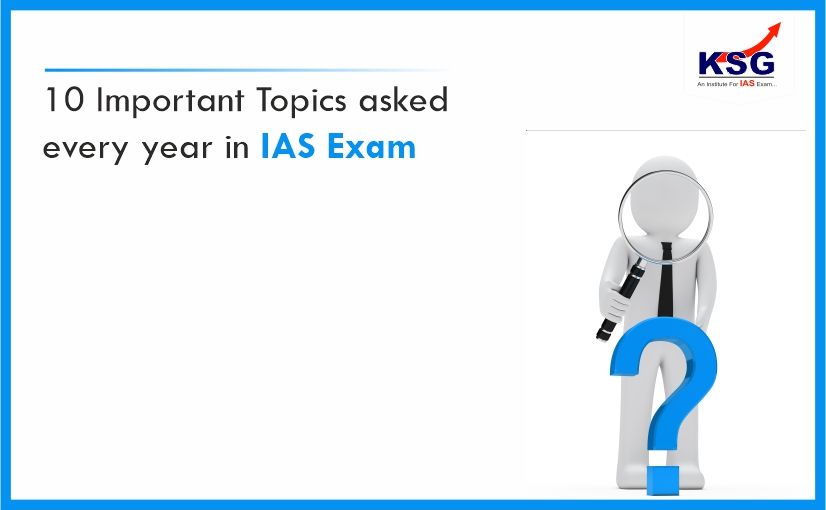10 Important Topics Asked Almost Every Year in IAS Exams
The examination pattern of the IAS exam is although unpredictable and you can’t apply the guesswork in such a prestigious examination in India but there’re some topics that are consistently asked in the IAS Exams.
10 Important Topics Asked Almost Every Year in IAS Exams
The examination pattern of the IAS exam is although unpredictable and you can’t apply the guesswork in such a prestigious examination in India but there’re some topics that are consistently asked in the IAS Exams. Studying these topics, raise your chances of scoring good marks in your dream exam. To help determinant IAS aspirants this year, here’s the list of top 10 important topics that are asked repeatedly every year.
Environmental Conventions and Agreements
Environmental agreements and conventions are considered the basis of international politics and this topic reflects the changing relationship of India's position at the international level. Questions are mostly asked from well-known protocols or agreements such as - Ramsar Convention, Kyoto Protocol, UNFCCC COP Meeting and major impacts on India's environmental policies.
Interactive organizations like Birdlife International, WWF, 360 Degrees, etc. have now become part of the IAS Prelims exam papers. The Paris Summit on Climate Change and the International Conference on Lakes are specifically asked in the IAS exam.
International Treaties, and Conventions
Due to India's growing role in global politics, questions based on topics related to this subject are definitely asked in the IAS exam. Generally, groups from India and major Asian countries like ASEAN, SCO, BIMSTEC, SAARC, and G20 are also very important from the IAS exam point of view.
Questions related to the major decisions and the protocols signed by the members are asked about the objectives of these organizations. Sometimes questions related to major global groups like UNSC, WTO, World Bank, etc. are also asked.
Scientific Achievement of Indians like in Space and Defence
Technology is considered as one of the most difficult sections of the IAS Prelims exam. Generally, the questions asked in Science and Technology in IAS Preliminary Examination are based on the current development work going on in the science and technology sector of the country. The questions are mainly on ISRO, DRDO and Ministry of Defense achievements like PSLV Satellites, Agni Missiles, Brahmos, Guided Missile System, etc.
For the Science and Technology section, IAS candidates should study one newspaper daily as the questions asked in the Science and Technology section in the IAS Preliminary Examination are usually based on current affairs.
New acts passed by Parliament and crucial bills.
Every year, questions related to the provisions of popular Acts like GST Bill, Land Acquisition Act, 14th Finance Commission Report, the constitution of 15th Finance Commission, Women's Reservation Bill pending in Parliament etc. are asked. The main source to know the updates of the major bills of Parliament is the annual report found on the PRS website
Government's New Social Welfare Schemes
The new social and economic welfare schemes are important for both the IAS Preliminary and the IAS Mains Examination. These schemes affect people's normal daily life in a big way and hence they are discussed a lot in current affairs. For example, questions have been asked on Jan Dhan Yojana, Namami Gange and Swachh Bharat Mission in IAS Preliminary Examination.
Each new plan and program is started with the introduction of annual financial statements and analysis of the plans is done through an economic survey. Both budget and the economic survey should be standard documents for reading government schemes
Important cultural sites and monuments in India
India is known all over the world for its cultural heritage and hence many culturally important issues are discussed in the current affairs and many monuments and places have been successful in making their place in the UNESCO list.
This list is readily available online. Read the complete list and try to remember important information about all the mentioned places like Harappa, Chola Temple, Ajanta Caves, Ellora Caves, Himalayan Institute et
Geographical indications, IPRs, trademarks, patents and agricultural implications
Details on all major advances in agriculture such as biotechnology, genetically modified crops, IPRs and GIs should be written separately as this section can be asked directly.
Most of the questions are factual but how do new techniques like basic topics work in agriculture and what will be the impact on agricultural practices. For example, questions on 'neem-coating' were asked in the IAS Prelims exam.
Most important conservation sites, national parks, etc.
All major conservation sites should be studied with related wildlife or flora. Every year at least 2 to 3 questions are asked from this list. The questions are usually factual. Adequate attention is also needed for places with lakes and places that are important for environmental protection. For example, questions can be asked about the role of evergreen forests and lakes in surrounding areas.
Freedom Movements in India
Of all the topics given in this article, this topic is considered the most stable and can be easily mastered through books like NCERTs and Bipin Chandra's Indian freedom struggle on these topics. The questions in IAS exam are related to the Non-Cooperation Movement, Quit India Movement and the personalities associated with various movements
Indian Geography
Study of these topics is also very important which can be easily studied through NCERTs and Oxford School Atlas. The focus should be on major river systems and their tributaries, especially rivers affecting the agricultural sector. The major trade routes and main industrial centres passing through the mountain passes are also very important.

